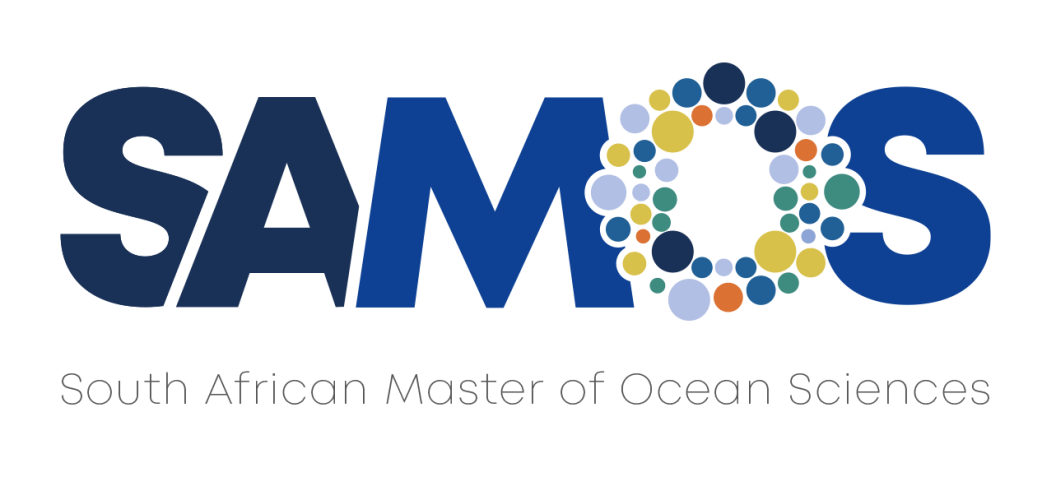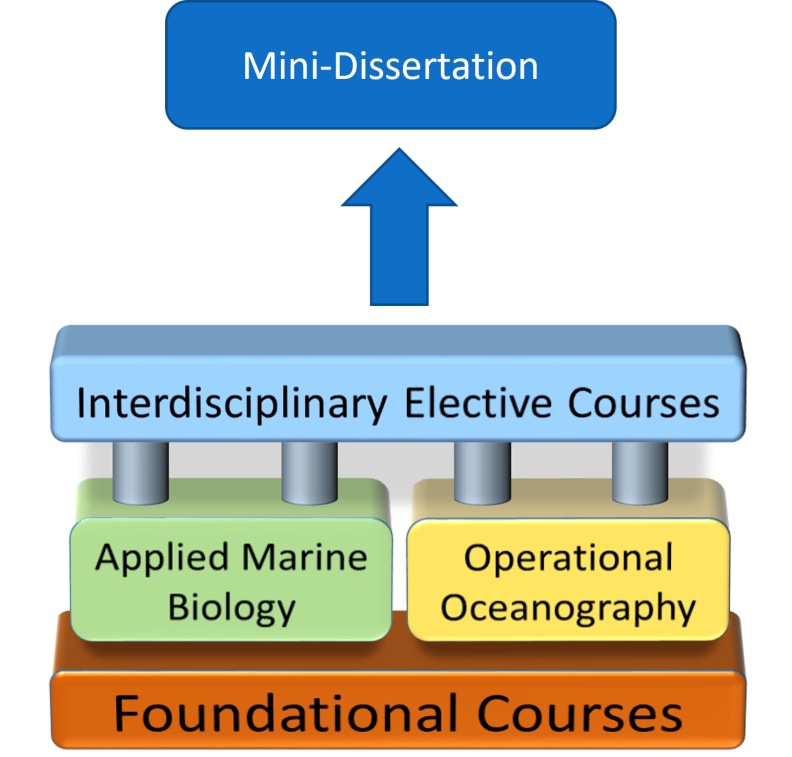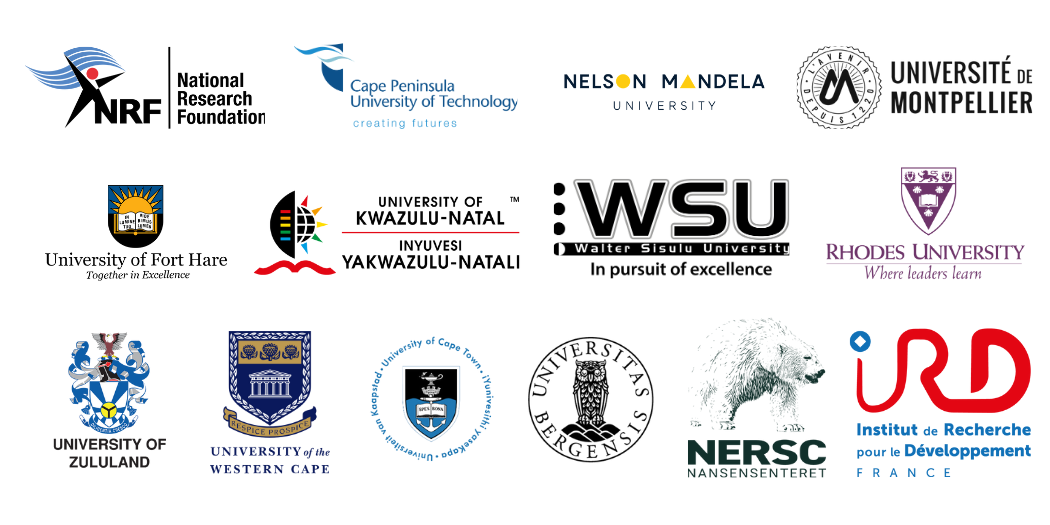
COURSE STRUCTURE
The 2026 AOS cohort will participate in the SAMOS programme (South African Master of Ocean Sciences), with teaching contributions from all the SAMOS partners.
The course provides interdisciplinary vocational training in applied aspects of oceanography and marine biology for future ocean professionals. The course is designed for both recent graduates as well as those with minimum five years’ work experience. Students will gain skills to operate in the ocean services sector, focusing on operational and conservational activities, consulting in ocean system's characterization, food, water quality and recreation preservation and other aspects of the Blue Economy.
The course code BIO5012W represents the overall coursework component and will reflect the overall coursework result. This full-time Master with coursework and minor dissertation is offered over one or two years, with SAMOS-funded students being able to defer the minor dissertation component to the second year.
The curriculum offers a choice of two streams: Applied Marine Biology (BIO5014Z) and Operational Oceanography (SEA5011Z), both of 40 NQF credits, with a common course in Foundations of Applied Ocean Sciences (BIO5013Z) of 50 NQF credits.

The following modules cover the foundational aspects of AOS-SAMOS:
1) Whole-of-systems approach to ocean sustainability, which focuses on paths to achieving sustainability in marine social-ecological systems. It will address the complexity of the task, and introduce students to varied concepts and approaches, using African examples where possible. The treated topics include project management, economics, law, socio-cultural systems, and institutional and governance arrangements.
2) Dynamics of African marine ecosystems, which ensures all students have basic knowledge of key physical, chemical, geological and biological concepts to help them understand how marine ecosystems function. Ecosystems will be covered in an interdisciplinary context, using African examples from eastern boundary, western boundary, tropical and polar regions.
3) Quantitative skills for ocean sciences, which provides introductory numerical skills in handling and analysing data. It will cover major statistical concepts and provide background knowledge of scientific programming, data management, and data visualization (including mapping), focusing on the main applications found in ocean sciences. Key packages to be used will be Ocean Data View, R and Python.
Students can choose to register for the minor dissertation worth 90 NQF credits in a number of disciplines offered by UCT or the SAMOS partner universities.
Pre-requisites for admission to the AOS-SAMOS programme:
- 4 years Bachelor degree (with research project) or Honours degree.
- Previous specialised knowledge of oceanography or marine biology is not essential.
- Students from both the natural and social sciences/humanities (+hons) are eligible, with a preference for students with a Science background and those who have proven numerical skills.
- An average of 65% in science subjects or >70% in other pertinent subjects
- Non-science students are required to write in their motivation letter how they will compensate for knowledge gaps in science subjects and numerical skills.
UCT Course Conveners
- Prof Marcello Vichi (UCT, Department of Oceanography)
- Dr Louise Gammage (UCT, Department of Biological Sciences)
NMU on-site coordinator
- Dr Denise Schael (NMU, Department of Ocean and Atmospheric Sciences)
SAMOS Partner Institutions
Nine South African Universities:
- Cape Peninsula University of Technology (CPUT)
- University of Cape Town (UCT)
- University of Fort Hare (UFH)
- University of Kwazulu-Natal (UKZN)
- University of the Western Cape (UWC)
- University of Zululand (UNIZULU)
- Nelson Mandela University (Mandela University)
- Rhodes University (RU)
- Walter Sisulu University (WSU)
Two institutions hosting national research infrastructures are also included in the initiative, providing teaching material and support facilities (i.e. access to laboratories, ship time, data archives, etc.):
- South African Environmental Observation Network (SAEON) and
- South African Institute of Aquatic Biodiversity (SAIAB)
The international partners are:
- University of Bretagne Occidentale (SAMOS project coordinator)
- French Institute for Sustainable Research and Development
- Nansen Environmental Remote Sensing Center
- University of Bergen
- University of Montpellier

Applications
The applications for the AOS-SAMOS 2026 programme are now open. Applications will close on Sunday, 31 August 2025.
The 2026 AOS-SAMOS programme will commence in February 2026 with the coursework component at the Ocean Sciences Campus, Nelson Mandela University, Gqeberha.
In the meantime, for those who are interested in applying for the AOS-SAMOS programme, you can prepare the following supporting documents into one pdf before submitting:
- Curriculum Vitae (max 2 pages)
- Proof of Highest Qualification
- Academic Transcripts
- Proof of Payment of UCT application fee
See more details on how to apply for the 2026 AOS-SAMOS programme in the recorded Information Webinar here.
UCT Science Faculty admission requirements
To learn more information about the UCT Science Faculty admission requirements, course information, course fees and funding opportunities, check the link below:
Science Faculty & Fees, Funding and Financial Assistance Handbooks
Recognition of Prior Learning (RPL) Overview
If you are interested in utilising the RPL method for admission to UCT, we suggest you visit this website for more information or contact Amy Rooks-Smith at the Science Faculty, or call her on 021 650 2082.